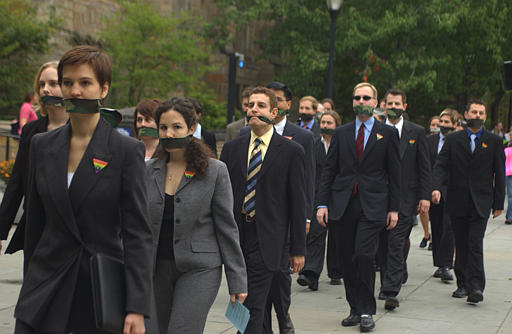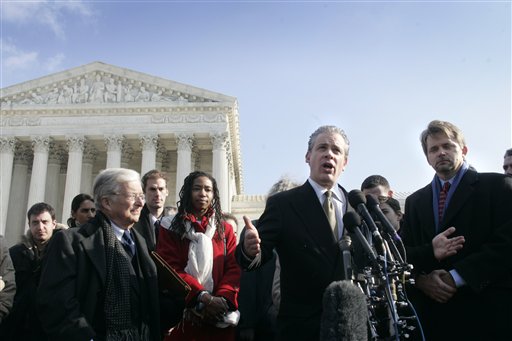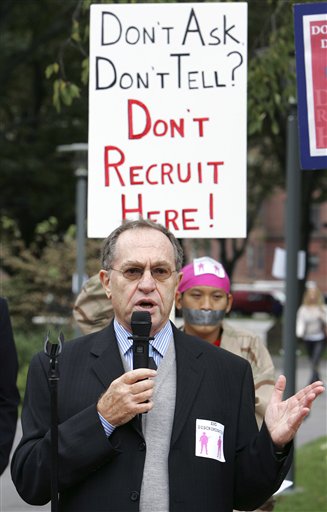In Rumsfeld v. Forum for Academic and Institutional Rights, 547 U.S. ____ (2006), the Supreme Court unanimously ruled that the First Amendment rights of institutions of higher education are not violated by a federal law that conditions federal funding on granting military recruiters the same access to campus as other employers.
In the 1990s, Congress passed a law called “Don’t Ask, Don’t Tell” barring gays and lesbians from serving openly in the military.
Law schools claimed conditioning funding on allowing military recruiters was unconstitutional
At that time, many law schools were already denying military recruiters access to their campuses, enforcing school prohibitions on campus recruitment by employers who discriminate on the basis of sexual orientation. In 1995 Congress passed the Solomon Amendment, modified several times since, providing that if any part of an institution denies military recruiters access equal to that provided to other recruiters, the entire institution would lose certain federal funds.
The Forum for Academic and Institutional Rights (FAIR), an association of law schools and law faculties, sued the Defense Department, claiming that the forced inclusion and equal treatment of military recruiters violated the First Amendment.

Yale students, wearing camouflage gags, march in 2002 at Yale, in protest against U.S. military recruiters participating at Yale Law School’s fall interview program. The gags symbolize the military’s “don’t ask, don’t tell” policy. (AP Photo/Douglas Healey, used with permission from the Associated Press)
According to FAIR, the Solomon Amendment compelled law schools to speak the government’s message by propagating and subsidizing the speech of military recruiters; limited the ability of laws schools to speak their own message by restricting the “expressive conduct” of denying military recruiters equal access to students; infringed on law schools’ right of expressive association by forcing them to associate with military recruiters who engage in discrimination which the school opposes; and unconstitutionally conditioned receipt of federal funding on relinquishing First Amendment rights.
The federal district court ruled against FAIR, but on appeal the Third Circuit Court of Appeals ruled that the Solomon Amendment unconstitutionally conditioned federal funding for universities on surrendering First Amendment rights.

E. Joshua Rosenkranz, second from right, speaks to the media after arguing before the Supreme Court in 2006. Rosenkranz represented the Forum for Academic and Institutional Rights (FAIR) and a coalition of law schools challenging the constitutionality of an amendment, passed in 1996, which required universities to grant military recruiters full access to students despite university non-discrimination policies. (AP Photo/Lawrence Jackson, used with permission from the Associated Press)
Supreme Court rejected First Amendment claims of law schools
In an opinion written by Chief Justice John G. Roberts Jr., a unanimous Supreme Court rejected each of FAIR’s contentions.
According to the Court, the Solomon Amendment does not unconstitutionally compel speech. Although law schools may be required to send scheduling e-mails for military recruiters, it “trivializes” the freedoms protected by the First Amendment to compare this to forcing students to pledge allegiance.
The Court also ruled that requiring law schools to host military recruiters did not affect the law schools’ speech. Nothing about recruiting suggests law schools agree with any recruiter’s speech and nothing in the Solomon Amendment restricts what the law school may say about the military’s policies. The law regulates conduct — admitting military recruiters to campus — that is not inherently expressive, unlike, for example, flag burning.
The Court also rejected the law schools’ claim that the Solomon Amendment violates their First Amendment expressive association rights. The law requires schools to “interact” with military recruiters, but their mere presence on campus does not make military recruiters members of the schools’ expressive association. Students and faculty are still free to associate to voice disapproval of the military’s policies.
Law in question did not regulate speech, Court said
Finally, the Court ruled that the Solomon Amendment does not impose unconstitutional conditions acceptance of federal funding, since the requirement that law schools provide military recruiters with equal access to campus could be constitutionally imposed directly on the schools under Congress’s power to raise and support armies.
The Solomon Amendment regulates what law schools must do, not what they may or may not say, and therefore does not violate the First Amendment.
This article was originally published in 2009. Raymond B. Wrabley Jr. is a professor of political science at the University of Pittsburgh at Johnstown. He teaches courses on American politics, policy, and political institutions that cover constitutional issues, including First Amendment controversies.

